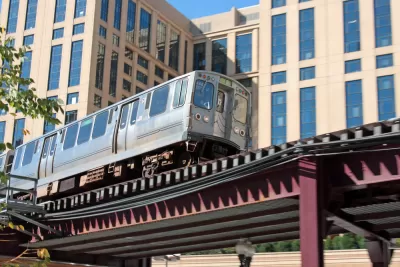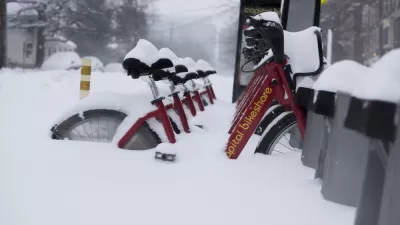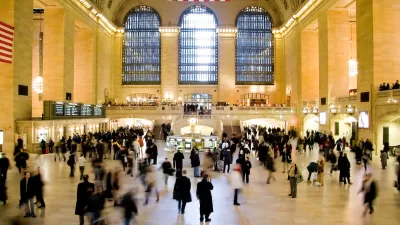The plan points to transit’s role in a cleaner and more sustainable future, but comprehensive changes in transportation policy are also needed.

The Green New Deal introduced by Representative Alexandria Ocasio-Cortez and Senator Ed Markey in February seeks to address climate change and economic inequality by fostering a green economy. The proposal would drastically shift national economic focus, including a move toward more sustainable transportation modes, writes Ben Fried and Hayley Richardson:
Until now, transit has been relegated to the margins of federal policy while the lion’s share of transportation resources go toward highways. The Green New Deal suggests a much different approach -- one that aims to put fast, reliable service within walking distance of as many homes and jobs as possible.
Fried and Richardson argue, however, that federal funding increases for transit are not enough and that more far-reaching policy changes are necessary. They want to see a move away from funding of highway expansion projects to ones that support transit and pedestrian and cycling infrastructure.
Further, they believe that transit projects need to maximize ridership, not just minimize costs. "Transit expansion projects are essential, but they must be built where large numbers of people can walk to stops. It’s worth the additional expense to build transit people will ride. In a climate crisis, we can’t afford to do otherwise."
Federal funding should also focus less on infrastructure and more on service and operations, say Fried and Richardson. "So how should federal policy improve local transit service? To start with, any operating support from the feds should come in the form of matching funds that don’t supplant local transit spending."
In addition, they argue that certain transit projects should be exempt from onerous environmental review processes. "Transportation agencies should also have more leeway to spend federal funds on pedestrian infrastructure. Most transit trips involve walking, and agencies shouldn’t have to apply for sidewalk funds from an alphabet soup of tight-fisted federal programs."
FULL STORY: Transit and a Green New Deal

Alabama: Trump Terminates Settlements for Black Communities Harmed By Raw Sewage
Trump deemed the landmark civil rights agreement “illegal DEI and environmental justice policy.”

Study: Maui’s Plan to Convert Vacation Rentals to Long-Term Housing Could Cause Nearly $1 Billion Economic Loss
The plan would reduce visitor accommodation by 25% resulting in 1,900 jobs lost.

Planetizen Federal Action Tracker
A weekly monitor of how Trump’s orders and actions are impacting planners and planning in America.

Waymo Gets Permission to Map SF’s Market Street
If allowed to operate on the traffic-restricted street, Waymo’s autonomous taxis would have a leg up over ride-hailing competitors — and counter the city’s efforts to grow bike and pedestrian on the thoroughfare.

Parklet Symposium Highlights the Success of Shared Spaces
Parklets got a boost during the Covid-19 pandemic, when the concept was translated to outdoor dining programs that offered restaurants a lifeline during the shutdown.

Federal Homelessness Agency Places Entire Staff on Leave
The U.S. Interagency Council on Homelessness is the only federal agency dedicated to preventing and ending homelessness.
Urban Design for Planners 1: Software Tools
This six-course series explores essential urban design concepts using open source software and equips planners with the tools they need to participate fully in the urban design process.
Planning for Universal Design
Learn the tools for implementing Universal Design in planning regulations.
Caltrans
Smith Gee Studio
Institute for Housing and Urban Development Studies (IHS)
City of Grandview
Harvard GSD Executive Education
Toledo-Lucas County Plan Commissions
Salt Lake City
NYU Wagner Graduate School of Public Service





























